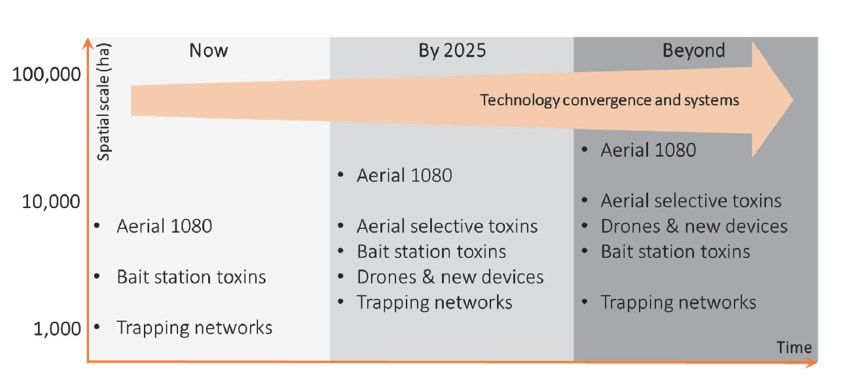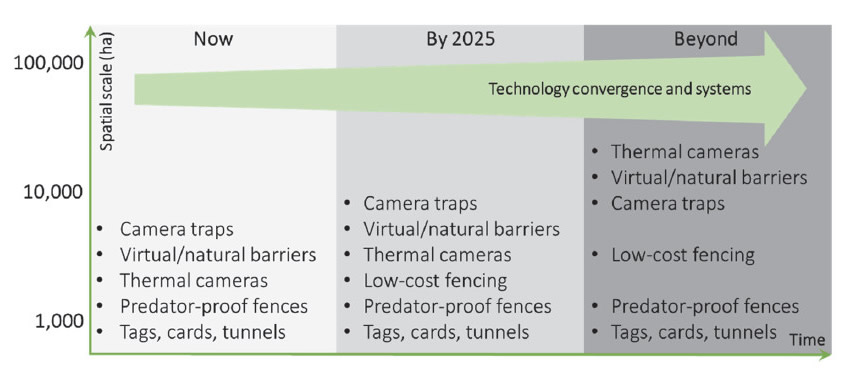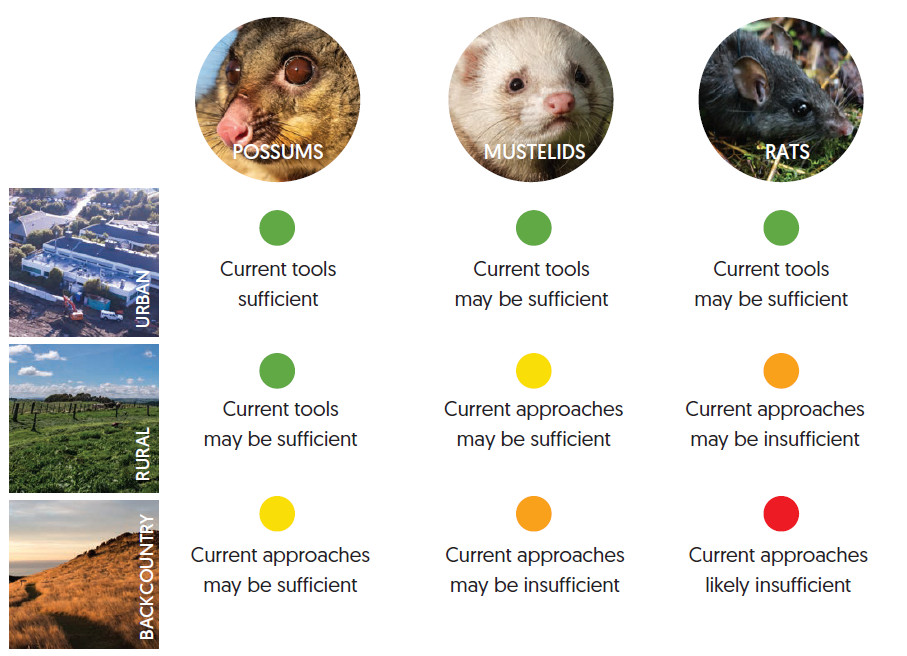Building the Predator-Free 2050 Limited Research Strategy for 2020-2024

Predator Free 2050 Ltd (PF 2050) was established in November 2016 with two aims: (1) to supercharge local and regional efforts to scale up predator suppression and eradication, working closely with community groups and regional and city councils, and (2) to focus research efforts to achieve a breakthrough science solution capable of eradicating at least one small mammal predator by 2025.
The inaugural PF 2050 Limited research strategy, consisting of projects running from January 2018 to June 2020, was designed to complement existing efforts to give the best chance of achieving an interim goal of achieving a breakthrough science solution by 2025 that is capable of eradicating at least one small mammal predator (see Kararehe Kino 31). The strategy, now nearing completion, has made strong advances through four programmes – ‘Environment & Society’, ‘Best Use of Existing Approaches’, ‘Exploring New Approaches’ and ‘Modeling and Data Sharing’.
A highlight of the research programme has been the building of capacity to achieve and maintain national possum eradication (see https://pf2050.co.nz/funded-projects/ for all project details and outcomes).
Construction of the second PF 2050 Research Strategy is now underway, to guide funding investment from July 2020 to June 2024. To better focus efforts on achieving the breakthrough science solutions needed, the new strategy will be based on a more fundamental understanding of which predators in which contexts need the most research support, beyond incremental and business-as-usual development, to enable eradication.
Strategy development is based on addressing three key questions for PF 2050’s target predators (possums, rats and mustelids): (1) For what spatial scale of achieving eradication is research support most needed? (2) For what spatial scale of maintaining eradication is research support most needed? (3) For which predators in which landscapes is research support most needed?
The ‘achieving and maintaining eradication’ questions are informed through consideration of current and near-future predator management tools and approaches; the spatial scale at which they are applicable for the achievement and maintenance of possum, stoat and rat eradication; and how this may increase over time through business-as-usual and incremental development, or targeted investment into underfunded avenues. This consideration is illustrated in Figures 1 and 2, underpinning the conclusions that research support is most needed to give more options for achieving and maintaining landscape-scale eradication.


The ‘which predators in which landscapes’ question is informed through consideration of the different life-history characteristics of the PF 2050 target predators, which have consequences for the effort, tools and approaches that will be required for their eradication at large spatial scales. This also has consequences for the current and predicted near-future state of play of projects attempting their eradication in urban, rural and backcountry landscapes.
This consideration is illustrated in Figure 3, underpinning the conclusion that new research focus is now most needed on enabling landscape-scale rat and mustelid eradication in New Zealand’s backcountry.

This synthesis clearly shows that while the research and development to enable national possum eradication is well underway, business-as-usual and incremental development alone is not going to enable Predator Free 2050’s goals of national predator eradication.
Capability building that enables trans-disciplinary approaches is needed for breakthroughs to overcome current barriers to scaling up. Ongoing conversations on social, cultural, ethical and policy acceptability will be essential for guiding the application of current and new tools.
The complete draft high-level strategy document is available at https://pf2050.co.nz/fundedprojects/, alongside a request for review feedback (and a form with which to do so). Also available is a form for researchers submitting funding applications for projects that will initiate in the new strategy timeframe, to request PF2050 Ltd Research Strategy co-funding.
CONTACT
Professor Dan Tompkins
Project Manager Science Strategy,
Predator Free 2050 Ltd
DanT@pf2050.co.nz
